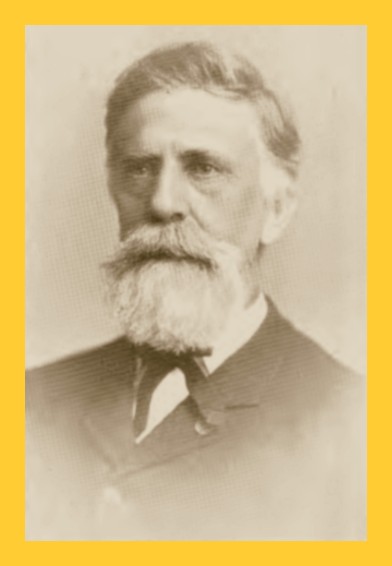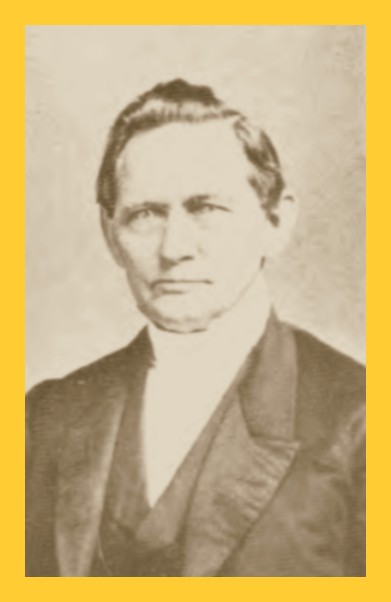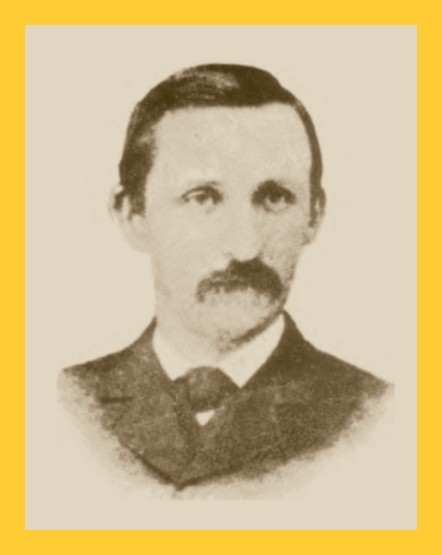A History of Berrysburg Seminary, from an address by D. G. Lubold at a reunion of alumni and students held at Berrysburg, Dauphin County, Pennsylvania, Thursday, August 11, 1904. Published by the Elizabethville Echo.
Part 2.
_________________________________
Rev. Henry S. Bassler, the founder of the Seminary, was born in Lower Milford, Lehigh County, Pennsylvnaia. In early life he was apprenticed by his guardian to learn the business of a tanner. During this apprenticeship he became possessed with the desire to enter the ministry, and in spite of the difficulties in the way, he took steps to realize his aspirations. He studied for four years with Rev. J. W. Dechant, whose daughter he afterward marries. Imbibing the missionary spirit of he preceptor, he undertook a missionary tour to the south. He traveled on horse-back, going as far as Guilford, North Caarolina, devoting a whole year to this work. On his return he completed a two years’ course in the Reformed Theological Seminary, then located at Carlisle, Pennsylvania, and was licensed to preach in the year 1829. His first charge was a Beaver Dam, Snyder County. His second charge was that of Milltown and Boyertown, extending through portion of three counties. At the latter place he established Mount Pleasant Academy, where one of his pupils was John F. Hartranft, afterward governor of Pennsylvania.
Rev. Bassler came to the Lykens Valley in the year 1843. The congregations composing his charge were Millersburg, Killinger, Berrysburg, Georgetown [Dalmatia], Gratz and Hoffman’s [Lykens Township]. After a pastorate her of nine or ten years he moved to Lehigh County, but in a few years returned to the Lykens Valley. He then received a call from Pleasant Grove, Indiana, and from there he went to Forreston, Illinois. In both those western states he organized a number of congregations that are still flourishing. In 1859 he was called for the third time to Berrysburg, where he labored during the period of the Civil War. From here he again went to his native county, Lehigh, preaching for a number of years in the same church (Zionsville), with which he and his mother had united forty some years before. His last regular charge was at Hegins, Pennsylvania, where, in his old age he served seven congregations. In 1877 he retired from active work of the ministry, and moved to Millersburg, Pennsylvania, where he died in 1883, aged 78 years. In his long life of ceaseless activity in the ministry, he was the constant friend of education, believing that the spiritual and intellectual development should go together; and he also exemplified the highest of all aims of education to fit one for service to his fellow men.
The following is almost a complete list of the various principals of the Seminary, and the period in which they had charge:
- Jacob S. Whitman, 1851-1853
- Levi K. Hoch, 1853-1855
- Jacob Miller, spring term, 1855
- Joseph F. Kennedy, August 1855-November 1856
- Peter S. Bergstresser, April 1857-June 1857
- Henry C. Vincent, 1857-1858
- John B. Beshler, completed term
- George M. Ettinger, April-October 1859
- Peter S. Bergstresser, November 1859-January 1862
- D. F. Swengle, April 1862-June 1862
- George M. Ettinger, 1862-1864
- Peter S. Bergstresser, April 11, 1964-October 1866; also August 1867-September 1874
- H, J. Hockenberry, September 1874-September 1875
- Alfred Anderson, September 1875-September 1876
- H. J. Hockenberry, September 1876-September 1882
Jacob S. Whitman, the first principal, came from Montgomery County, and had taught a term of private school in Berrysburg when he took charge of the Seminary. He was a married man and resided in the building. At the same time Miss Luckinbach, of Bethlehem, Pennsylvania, taught music and assisted in general. After teaching about two years, Prof. Whitman went to Freeburg, Pennsylvania, as the first principal of the academy established in that place. He also taught at New Berlin and later moved to Nebraska.
Nothing could be learned of the second principal, Levi K. Hoch, except that he is still recalled by some who had been his pupils, as a very excellent teacher.
Jacob Miller was a native of Lebanon County. He also taught here only a short time when he went to Princeton, Illinois, to take charge of the public schools of that place.
His successor, Joseph F. Kennedy, was a native of Hollidaysburg, and a graduate of Dickinson College. His work was very satisfactory, but he was compelled to resign because of ill health. He studied medicine, and in 1858 moved to Iowa, where he is still living. He is Secretary of the State Board of Medical Examiners, with headquarters in Des Moines.

It was at this early date in the history of the school, following the resignation of Prof. Kennedy, that Peter S. Bergstresser, A. M., first became connected with the school as a teacher. He had been for some time a student in the Seminary, and was preparing for college. At the solicitation of friends, he taught one term, leaving in the fall to enter Lafayette College.
A very capable principal was again secured in the person of Henry C. Vincent. He was a college graduate, and possessing considerable executive ability, the school was built up rapidly. For assistants he had John B. Beshler, one of the brightest of the former students in the Seminary, and E, J. Stirl, a German, who taught music. From a catalogue published in 1858, the first issued by the school, as so far as is known, the only one until some twenty years later, some interesting facts have been obtained. There was a classical and an English department, with 20 students credited to the former and 56 to the latter. The whole whole number of students at the Seminary since its organization is given as 961. The academic year was divided into two sessions of five months each, and the sessions into two quarters of eleven weeks each. Boarding, with furnished rooms, was $25 per quarter, light and fuel extra. A Polytechnic Society had been organized for mutual improvement in Composition, Elocution and Discussion. The library must have been started before this time, as charges were made for its use.
The list of text-books given covers almost a full college course. The names of most of these are unfamiliar today. In Spelling and Defining, Webster’s text-book was used; Reading, Sanders and Parker; Arithmetic, Greenleaf; United States History, Wilson; English Grammar, Smith and Kirkman; Familiar Science, Peterson; Natural Philosophy, Olmstead and Comstock. In the higher mathematics, Loomis; Trigonometry, Surveying and Engineering were used; in the classics, Bullion’s Latin and Greek Grammars, and Authon’s texts for Virgil, Cicero, the Anahasis and Herodatus are named.
The prospects were bright for a successful period in the history of the Seminary, when unfortunately Prof. Vincent took sick with typhoid fever, returned to Milton and died. He was buried at McEwensville. The term was completed by John Beshler and George M. Ettinger.
Peter A. Bergstresser was persuaded to leave college and take charge of the school. He began to teach November 2, 1859, with only seven pupils present. We have the names of six of those. They are Jacob Moyer, Jonathan Bleistein, of Duncannon, Jeremiah Enterline, John Rupp, Jeremiah Swab and Cornelius Swab. On July 30, 1866, the trustees elected Prof. Bergstresser principal for one year at a salary of $375. They also fitted up a music room and bought a piano. At the same time, Miss Sophia Wilcox, of New York State, was elected teacher of music, and to assist in general, Preston Miller, to teach practical surveying. Prof. Bergstresser continued to teach until January 27, 1862, when he resigned and went to college, and from there was drafted into the army, serving nine months in the war. D. F. Swengle, who succeeded him, was a native of New Berlin, Pennsylvania, and a graduate of Dickinson Seminary. He taught several terms, but left shortly afterward to join the army, Mr. Clay Bergstresser completing the term.
The next principal, George M. Ettinger, of York, though no college graduate, was a good teacher. He had several able assistants. One, William H. Griffith, also of York, was a graduate of Dickinson College. For several years the school prospered, when there was again a complete change of teachers. In the fall of 1866, there being no regularly elected principal, Prof. Bergstresser again taught a term before returning to college. He entered the senior class in October of this year. During the winter of 1866-1867, as for several other terms, the building was rented for pubic schools.
The following August (1867), Prof. Bergstresser, who had graduated at Lafayette College, was again elected principal of the Seminary and continued in that position until September 1874, when he left Berrysburg to take charge of the Lykens schools. He was assisted at various times by different teachers. In 1868 the assistant teachers were H. L. Lark and Miss Emily M. Bergstresser. In 1873 Miss Agatha Steck taught music. John Klinger and Maggie Bordner were other assistants.
Prof. Bergstresser was in charge of the Seminary the longest of all the teachers. During that time hundreds of young men and women were under his instruction, and their success in business, in teaching and in the learned professions is the best tribute to his influence and ability as a teacher.
In the summer of 1874, Prof. H. J. Hockenberry, of Martinsburg, West Virginia, was elected principal of the high school. He had graduated the year before at the head of his class from the Millersville State Normal School. Together, with a wide culture, the newer normal methods of teaching, and an intense enthusiasm, he possessed the rare power of the teacher to inspire his pupils with that same enthusiasm. As a result he became very popular. At the end of one year he left Berrysburg to take charge of an academy at Smyrna, Delaware, and Alfred Anderson succeeded him here. Not finding conditions at the latter place as he had reason to expect, Prof. Hockenberry returned the following year, and for four years continued to [conduct] sessions of the Seminary during the summer. These sessions were well attended, many of the students being teachers of this and adjoining counties.
Thus far in the history of the school there had been no fixed course of studies with graduating exercises to mark its completion. It was customary to hold an entertainment at the close of the school terms, the money realized from a small admission fee being devoted to the purchase of books for the library. In the fall of 1879 the first commencement was held and a class of eleven students having completed a definite course, received diplomas. The following year no class was graduated, but in 1881 there was a class of six and in 1882 a class of eight.
Class of 1879: Katie D. Miller; Clennan A. Bowman; Henry G. Dornheim; J. Henry Eisenhower; Anson S. Johns; Monroe D. Lehr; Daniel G. Lubold; Milton A. Miller; Charles M. Rickert; Daniel H. Romberger; Joseph M. Walborn.
Class of 1881: William. H. Parfet (deceased); P. W. G. Raker; Andrew B. Saylor; Frank P. Stine; William E. Yeager; Eugene H. Zerfing.
Class of 1882: Annie L. Lenker; Sue S. Hoffman; Minnie A. Snyder; Milton E. Buffington; Samuel W. Cooper; J. Harvey Miller; Stephen A. Sours, Clement H. Stroup.
Several years after coming to Berrysburg, Prof. Hockenberry became involved in an unfortunate church controversy. An opposition was developed that entirely controlled the school board in 1879, and elected another principal for the high school. The friends of Prof. Hockenberry, not wishing to have him leave the place, rented the Odd Fellows Hall, now the United Brethren Church, and he continued to teach there for three years. To his pupils and friends, where Prof. Hockenberry taught, there was the Seminary. The teachers of the public schools also conducted spring and fall terms under the name of the Berrysburg Seminary, The people for many miles around took sides in the conflict, and during those three years the town was crowded with students.
In the meantime, Prof. Hockenberry and friends were perfecting plans to place the Seminary on a permanent basis by incorporating it and erecting new buildings. On February 21, 1881, a perpetual charter was granted to the Seminary by the Dauphin County Court. This charter provided for thirteen directors, three of whom were to act as President, Secretary and Treasurer respectively. The directors were:
- J. S. Snyder, president
- M. W. Sponsler, secretary
- Josiah Yeager, treasurer
- Valentine Lenker, Berrysburg
- Martin W. Weaver, Berrysburg
- Hiram Matter, Berrysburg
- Benjamin Bordner, Berrysburg
- Benjamin Romberger, Berrysburg
- Daniel Buffington, Gratz
- Benjamin Rickert, Loyalton
- James Miller, Elizabethville
- Samuel Horning, Carsonville
- G. W. D. Enders, Fisherville
In the summer of 1882, Prof. Hockenberry, becoming discouraged with the conditions existing here, accepted the principalship of the Carbondale schools. The fall term, which he had begun, was completed by Prof. H. D. Gise and Miss Katie D. Miller. Prof. Hockenberry returned for commencement and delivered the diplomas to the graduating class. This has been regarded as the end of the Berrysburg Seminary. The old brick building was used for school purposes until the year 1891, when it was torn down and the bricks used for the new public school building erected opposite the Lutheran and Reformed Church.
To be continued in Part 3.
_________________________________________
Corrections and additional information should be added as comments to this post.

